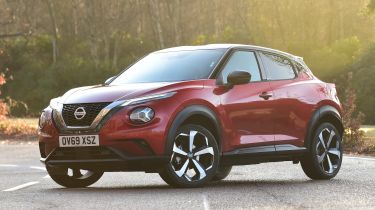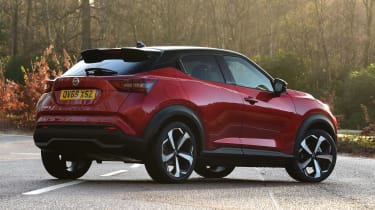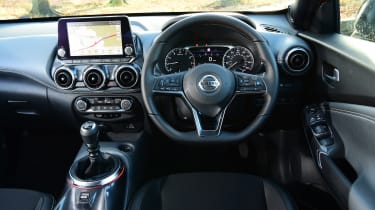Used Nissan Juke (Mk2, 2019-date) review: a funky and affordable crossover
A full used buyer’s guide on the Nissan Juke, covering the Juke Mk2 that has been on sale since 2019
Verdict
While the original Juke may have launched an entire new segment, there was plenty of room for improvement in terms of its driving experience and interior quality. The second take on the formula made great strides in both of these areas, but it was still beaten by some of its key rivals, and unfortunately it still is. The Kia Niro pipped it into second place in a twin test, and when we pitted a Juke against the Vauxhall Mokka and Hyundai Kona, they both came out ahead of the Nissan. But the Juke has sold in big numbers and it’s far from a duffer; you just need to try out a few alternatives before committing to buying one, because you might just find that you prefer one of the Nissan’s rivals.
The small SUV class is one of the most popular, so it seems incredible that until the original Nissan Juke was launched in 2010, this type of car didn’t exist.
Having launched the crossover genre with the first-generation Qashqai in 2007, Nissan downsized for its next trick, with a smaller car that also blended SUV looks with inexpensive pricing and running costs.
The Juke’s exterior styling was divisive to say the least, but the car was affordable, funky and different – and that was sufficient for many buyers. Sure enough, the Juke sold like hot cakes and with nearly a million shifted in Europe alone, it was inevitable that Nissan would produce a sequel. When that car arrived nine years later, it was much more grown-up in every way.
History
The first Juke Mk2s were delivered in December 2019, priced between £17,395 and £25,395. There was only one engine: a three-cylinder 115bhp 1.0-litre turbo unit that was marketed as the DIG-T 117. Buyers could choose between six-speed manual or seven-ratio dual-clutch automatic gearboxes, and there were five trim levels, as well as a launch-only Premiere Edition.
By December 2020 Nissan had tweaked the 1.0-litre engine to be cleaner, but this cut power slightly, to 113bhp – which is why it became known as the DIG-T 114.
Used - available now
In February 2022 the brand introduced a hybrid powertrain option, with a 93bhp 1.6-litre petrol unit backed up by a 48bhp electric motor. This was fed by a 1.2kWh battery pack, in order to give more power combined with better fuel economy.
Which one should I buy?
The DIG-T 114 and 117 engines are much the same to drive and both transmissions are nice to use and easy to live with. The hybrid can be significantly more economical if you do mainly urban journeys, but the price premium is significant, and you won’t get that back. It’s better to drive than the 1.0-litre car, however, and this alone might be enough to justify the extra outlay.
All Jukes have a DAB radio, cruise control and LED headlights, but the entry-level Visia is quite spartan (and highly unusual on the used market), but it does come with air-con. The Acenta is a better bet with its eight-inch touchscreen and rear camera, while N-Connecta adds climate control, automatic headlights and wipers, plus navigation. The Tekna adds synthetic leather trim, a Bose hi-fi, parking cameras, plus heating for the front seats, steering wheel and windscreen.
Alternatives to the Nissan Juke
The Kia Niro was the 2023 Carbuyer Car of the Year and is an impressive all-rounder, as is the Hyundai Kona, which is closely related. We also like the Peugeot 2008, which shares much with the Vauxhall Mokka and Citroen C4. There is also the Renault Captur, which is one of our favourite micro-SUVs. Toyota has two contenders in the shape of the Yaris Cross and C-HR, while the Ford Puma ought to be on your shortlist, because it ticks so many boxes.
The Kia Stonic is worth a look, while the Volkswagen T-Cross, Skoda Kamiq and SEAT Arona are all very closely related under the skin, and they’re very desirable for their blend of quality, efficient engines and user-friendliness. The Jeep Renegade is another alternative, albeit one that’s outclassed.
What to look for
Going spare
All Jukes came with a tyre mobility kit instead of a spare wheel, but a 145/90 R16 space-saver was optional at extra cost.
Hybrid power
The hybrid doesn’t use the 1.0-litre engine of the regular Juke; instead, it’s fitted with a 1.6-litre unit and a 1.2kWh battery.
A bit of luxury
Over the regular Tekna, the range-topping Tekna+ trim featured only cosmetic upgrades, including two-tone metallic paint.
Seeking comfort
The Acenta spec’s optional Comfort Pack added climate control, automatic wipers, folding door mirrors and heated front seats.
Reliability
While the original Juke seems to have had more than its fair share of potential problems (although the oldest examples are now 13 years old), a trawl of owners’ forums suggests that the latest version is performing well, with no significant fault patterns recorded so far. Most examples are still in warranty, however.
Interior
The Juke Mk2 is streets ahead of its predecessor in terms of the cabin’s build quality. The seats are comfortable and supportive, and the infotainment is much better than before, but it’s still beaten by some rivals. Rear-seat legroom is pretty good, but tall people might struggle because of the sloping roofline.
The main problem is the rising waistline, which makes the back seats feel more claustrophobic than they are, because of the small windows. Boot space is good, at 422 litres, which rises to 1,305 litres if the back seats are folded. Hybrid models aren’t quite as big, at 354 litres, or 1,237 litres with the seats down.
Prices
No matter how specific your requirements in terms of engine, trim, colour or mileage, your perfect Juke should be out there somewhere. We found more than 1,600 of them for sale, with N-Connecta by far the most common trim. It accounts for just over half of the Jukes available, with Tekna next; the Visia is rare. About 40 per cent of Jukes are automatics, while hybrids are less common.
To check prices on a specific model head over to our valuation tool.
Running costs
All Jukes need to be serviced every 12 months or 18,000 miles, whichever comes sooner, with work alternating between minor and major, at £239 and £349 respectively. The minor service incorporates only an oil-and-filter change, whereas the major one includes replacement brake fluid (which is due every other year) and a new air filter. There’s no set schedule to replace the engine coolant, thanks to the use of long-life fluid, so it just needs to be checked at each service and replaced as necessary. Because all Juke engines are chain-driven, there are no cambelts to replace.
Have your Juke maintained by an official Nissan dealer, and the cost of each service includes one year’s RAC European roadside assistance. The standard warranty is three years or 60,000 miles, but this can be extended up to 10 years or 100,000 miles.
Recalls
Nissan has recalled the original Juke on no fewer than 11 occasions so far, but its successor has been the subject of only two actions to date. The first was issued in October 2021, because 13,569 Jukes made up to the end of August 2020 were fitted with faulty hooks for the back seats, which might not engage when the seat was in use. The solution was to fit a new set of latches.
The second recall was issued in April 2023, but it affected only hybrid editions, built between June and December 2022; in all, 3,157 cars were caught up in the campaign. The problem centred on the software that controlled the hybrid powertrain (or in Nissan speak, the HEVC, or Hybrid Electric Vehicle Control), but the solution to the problem was straightforward enough; a software update was all that was required.
Driver Power owner satisfaction
The Juke Mk2 made its Driver Power New Car survey debut in 2022, when it finished in 49th place out of 75 models, before slipping to 64th the following year. The navigation scored reasonably well, but it was the quality of the cabin and seat comfort that owners liked most. Other than that, the Juke didn’t rate very well in any category, with drivers particularly unimpressed with the car’s ride and handling.
Looking to sell your current car quickly and for a good price? Try our Free Car Valuation tool today!















